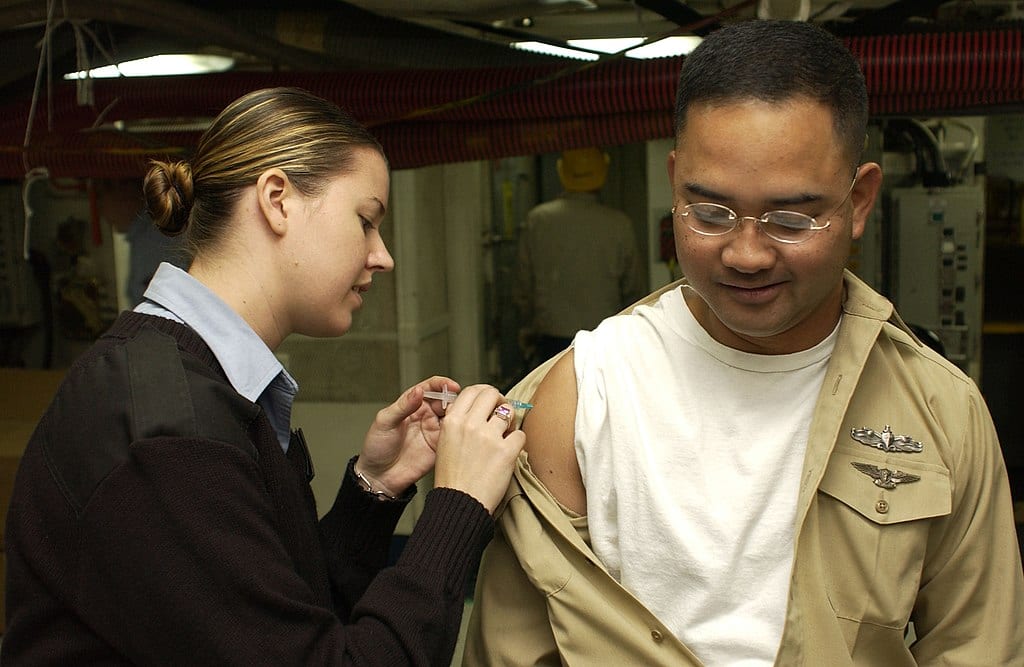Flu season is here – and as the proud owner of two tiny little disease vectors (otherwise known as my beautiful children), I can tell you that getting sick is way easier than you might think.
Sure, you can wash your hands, try not to touch your face, and carry hand sanitizer everywhere you go, but following every single protocol didn’t save Kate Winslet in Contagion. Chances are, they’ll eventually let you down, too.
If you didn’t get the flu shot back in the early fall when it was recommended – because you decided to tough it out, or didn’t have time, or whatever – you might be thinking it’s too late to get one now.
Image Credit: Pixabay
You would be wrong, according to Dr. William Schaffner, an infectious diseases specialist at Vanderbilt University Medical Center.
“It’s late – but not too late.”
The vaccine does take a few weeks to build up its protection in your body, and flu season peters out around the end of February, so although you’re not too late yet, you might not want to wait any longer.
The flu can be passed around any time of year, but in the States, it is most likely to be diagnosed between October and February. That said, flu cases have been known to regularly appear as late as May.
Image Credit: U.S. Navy
You can actually get a flu shot year round, though Dr. Robert Glatter, an E.R. physician with Lennox Hill Hospital, admits there are optimal dates to try to get it done.
“You can vaccinate any time of year, but ideally, it happens in the fall.”
If you’re high risk for some reason, Dr. Joseph McBride says that it might still be a good idea to get the flu shot, even when the season begins to wane in February or March.
Another thing – you should get the flu shot even if you’ve already had the flu, doctors say. There are two reasons: first, Americans often think they have the flu but never go to a doctor and turn out to have been battling a different virus. Second, there is more than one strain of flu circulating this year, says McBride.
Image Credit: U.S. Navy
“We’ve picked up information in our surveillance system that an occasional poor soul has had one kind, recovered and then gotten another one. That’s not common, but when you have two sequential dominant strains it’s going to be more common than it has been in the past.”
Although you can technically get a flu shot any time of year, the vaccines are updated for what physicians and disease experts are expecting to see each season, so if you got one over the summer, it might not be for the strain that’s expected to dominate the following winter.
The optimal time to get a shot is late September into October. A shot received in that window should give anyone with a good immune system and no secondary complications protection until late winter/early spring.
Image Credit: Pixabay
If you’re older, younger, pregnant, or have other complicating factors, Dr. Schaffner says definitely wait a bit into the fall, because there’s some debate on how long the shot’s protections last for those kinds of people.
“I would not recommend getting a flu vaccine in August. It’s a once a year type thing, which makes it a good reason to wait until September or early October to get vaccinated.”
So there you have it, folks! Getting a flu shot reduces your chance of being completely miserable (if you’re healthy) or losing your life (if you’re in one of those other groups) by around 60%, so make sure you clear some time in your busy schedule to get one on board – if not this month or next, then definitely next fall.
Your body (and everyone who has to be around you) will thank you.
The post It’s Not Too Late to Get Your Flu Shot, so Go Do It! appeared first on UberFacts.



